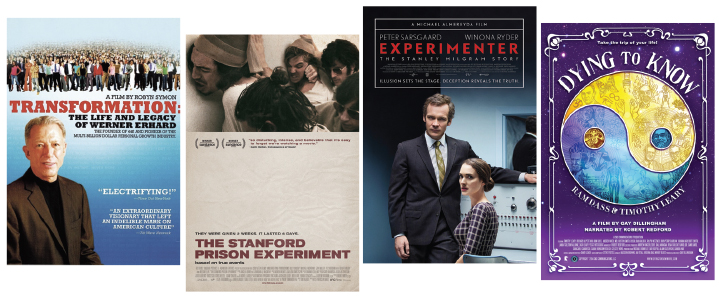
Psychology research rarely gets the Hollywood treatment, so when 2015 brought two feature films about a pair of mid-20th-century psychology experiments, Penn Integrates Knowledge professor Jonathan Moreno—a longtime movie buff—took notice. Experimenter offered a fictionalized take on Stanley Milgram’s infamous experiments on obedience to authority in the early 1960s. The Stanford Prison Experiment dramatized Philip Zimbardo’s 1971 experiment on how readily subjects might assume roles as guards and prisoners, charged with inflicting punishment or yielding to it—a situation that, in real life, famously spiraled out of control. When Moreno, the David and Lyn Silfen University Professor of medical ethics and health policy, learned of the forthcoming documentary Dying to Know, about psychedelics guru Timothy Leary and his long, strange trip with fellow Harvard psychiatrist Richard Alpert (later known as Ram Dass), he pounced on an unlikely idea: a bioethics film festival.
Together with the 2006 documentary Transformation: The Life and Legacy of Werner Erhard, which examines the self-improvement phenomena known as Erhard Seminars Training (EST), which flourished during the 1970s and ’80s, those films formed a lineup organized around the theme of “authority and rebellion.”
“A lot of what we see in these four films has to do with who decides who and what we are, and to what extent can we rebel against that authority?” Moreno says. “They seemed like they would make for great conversation.”
The “First Annual Penn Bioethics Film Festival” featured several faculty members from the Department of Medical Ethics and Health Policy, as well as Penn experts from other fields (including management and cinema studies), along with special guests Werner Erhard and Zach Leary, Timothy’s son.
It drew about 500 curious attendees—including most of the students in Elizabeth Mackenzie G’87 Gr’94’s “Complementary and Alternative Medicines” class, who spontaneously attended after a class devoted to shamanism earlier that day. “The event was a real morale booster for the department,” Moreno says, “and great exposure for us.”
The festival kicked off with an evening showing of The Stanford Prison Experiment. Directed by Kyle Patrick Alvarez, the movie stars Billy Crudup as Philip Zimbardo. The devolution of Zimbardo’s experiment into abusive behavior and a prison riot makes for painful viewing, but it also turned the experiment into one of the most famous ever, a stalwart of every beginning psychology class—despite or perhaps because of the many critiques leveled at the experiment’s design. As Meta Mazaj, a senior lecturer of cinema studies, observed in a post-screening panel, the film’s “claustrophobic intensity” put the audience right into the experiment while heightening the “sense that everyone is being watched or is watching.”
The second day paired the two documentaries. Robyn Symon’s Transformation offered a compelling (and mostly hagiographic) portrait of Erhard and his movement. In original footage of his empowerment sessions from the ’70s, the leisure suit-clad Erhard comes across as a charismatic but despotic leader who repeatedly pushed paying attendees to wake up, stop making excuses, and let go of their baggage. (“You’ve been carrying your dead father’s body around for years,” he tells one attendee.)
That screening brought out the festival’s biggest crowd—many of them former “EST-ees” drawn by the promised appearance of the Great Man himself.
“Give it up for the kid from Norristown,” Moreno said as he invited Erhard, still slim and handsome at 80, to join him onstage. “I have a confession to make,” Moreno added after the audience erupted in a standing ovation. “The reason I wanted to have a bioethics film festival is so I could hang out with Werner Erhard.”
During the freewheeling conversation that followed, Erhard spoke about his reaction to the documentary, noting, “It’s a very moving experience to see people being straight about their past”—adding, with a laugh: “to be Werner Erhard-ish about it.”
He also discussed his work in hotspots like the then-crumbing Soviet Union and Northern Ireland after he sold the intellectual property rights of EST and left the country in 1991, and touched upon current projects, including developing his self-improvement concepts for an academic environment.
Enthusiasts with another special interest—drug legalization—were drawn to the evening presentation of Dying to Know. Fabian Toro, a senior majoring in chemical engineering, said he was “interested in learning about issues related to the regulation of drug use, whether for illicit or pharmacological purposes,” adding that he was doing research on how medicinal plants can play a positive role in society. “Is there a way to combat the fear-mongering and stigma?” he wondered.
Marketed as a “cosmic buddy film,” this documentary by Gay Dillingham reunited Dass with a dying Leary in 1995, and incorporated archival footage of the two as well as ongoing interviews that she conducted with Dass and other members of the Leary coterie after Leary died.
After the film, Dominic Sisti GGS’00, director of Penn’s Scattergood Program for Applied Ethics of Behavior Health Care, sat down with Zach Leary (host of the podcast “It’s All Happening”) and Rick Doblin (founder of Multidisciplinary Association for Psychedelic Studies, a nonprofit research and educational organization that “develops medical, legal, and cultural contexts for people to benefit from the careful uses of psychedelics and marijuana”) to chart the elder Leary’s influence on everything from rock music to today’s wide acceptance of yoga practices and hospice care.
Doblin also discussed therapeutic uses for psychedelic drugs such as MDA, which can be administered to people who are just days away from dying, allowing them to control pain while staying awake and alert, rather than lolling in an opiate fog. “I think that was one of the most moving pieces that I learned from the film,” Sisti remarked. “That you can actually facilitate really difficult conversations at the end of life that are healing to everyone.”
The festival concluded with Experimenter, about the canonical Milgram experiments, in which subjects (“teachers”) were exhorted to administer progressively higher levels of what they thought were electric shocks to unseen victims (“learners”). In actuality, no electricity surged and nobody suffered physically—though many of the “teachers” became distraught over their own compliance.
The movie unfolds in a leisurely and curious way, with Peter Sarsgaard as Milgram occasionally breaking the fourth wall and addressing viewers directly. “It makes us feel somehow complicit,” observed David Fox, a lecturer in theatre arts and English, in the subsequent panel discussion. “It’s an interesting way of setting this up so we’re not initially alarmed. The bookends of the movie have this very arch quality—but in the middle you see there are real ethical issues.” The panel, which was moderated by Lance Wahlert Gr’11, assistant professor of medical ethics and health policy, concluded by finding parallels in the experiments to contemporary hot buttons like internet bullying and reality shows.
So many threads—and so many that remain to be explored. “Countless films are actually about bioethics,” Moreno said after the festival’s conclusion. “I can see future festivals organized around robotics, genetics, or inter-species relations—just off the top of my head.”




